Description
It is a spinous deciduous and aromatic tree with long, strong and axillary spines. This tree grows up to 18mt in height and thickness of tree is about 3-4ft. Leaves are 3-5 foliate, leaflets are ovate and have typical aroma. Flowers are greenish white in color and sweet scented. Fruits are large, woody, greyish yellow, 8-15 celled and have sweet gummy orange colored pulp. Seeds are compressed, oblong and numerous found in aromatic pulp.
General Information
Bael is also known as Bilva in Sanskrit language. In Ayurveda, it is more commonly known by the same name. This herb has great medicinal, spiritual and religious significance. Its fruits and leaves are considered sacred and used as offerings to the Hindu Gods like Lord Shiva. This is why it is also known as “Shiva druma” or the tree of Shiva in ancient scriptures.
Bilva is also known for its great properties of keeping blood sugar levels under control for which it is being explored far and wide. It is also great for digestion and helps to keep the intestines healthy.
Different parts of this herb are used for different purposes. Its fruit is relished as a whole as well as for its chilled juice which is very good to beat the heat in hot and scorching summers like those of northern India.
The leaves are also a significant contributor to the many beneficial properties that Bilva herb exhibits. Old yellow fruits of this tree turns green after one year. It contains tannic acid, volatile oil and mucilaginous liquid.
Special Note About AegleMarmelos
- Unripe fruits – Balance Kapha and Vatadoshas.
- Ripe fruits – Difficult to digest and aggravate all three doshas.
- Roots – Improves digestion, prevent vomiting and balance all three doshas.
- Leaves – Relieves pain, dyspepsia, gastritis and abdominal colic pain. It also balances all three doshas.
- Stem – Good for the heart, effective in rheumatoid arthritis and improves secretion of digestive enzymes.
- Flowers – Relieves diarrhea, dysentery, thirst and vomiting.
Classification
- Kingdom – Plantae
- Order – Sapnidales
- Family – Rutaceae
Habitat
Bilva is a very common herbaceous plant native to Bangladesh, Sri-Lanka and India. It grows in most parts of the Indian sub-continent, Myanmar and South – East Asia. Forests on hills and Rajasthan is suitable climate for this tree. This herb is also distributed in other countries such as Pakistan, Nepal, Philippines, Fiji, Cambodia and Thailand.
Ayurvedic Properties
| Hindi / Sanskrit | English | ||
| Rasa | Katu, Tikta, Kashaya | Taste | Pungent, Bitter, Astringent |
| Guna | Grahi, Snigdha, Tikshna | Physical Property | Absorbent, Unctuous, Sharp |
| Virya | Ushna | Potency | Hot |
| Vipaka | Katu | Metabolic Property (After Digestion) | Pungent |
Effects On Doshas
It balances tridosha.
| CharakSamhita | SushrutSamhita |
| · Shothhara – Herbs which Relieve inflammation.
· Arshoghana- Herbs which are good for haemorrhoids. · Shirovirechan- Herbs which are good for cleansing the head / Sinuses. · Asthapanopaga- Herbs used in basti treatment. |
Varunadi, Ambashtadi, Brihatpanchmoola, Dashmoola |
Practical Uses Of AegleMarmelos
- As already discussed above, different parts of the Bael plant are used for different health conditions. Special emphasis has been given to the ripened fruits which are not considered as healthy and if consumed, may lead to unnecessary bloating and indigestion.
- Researches are on to explore more on the hypoglycemic action of this plant and leaves have anti-diabetic properties. It helps to control diabetic polyuria. Bilva helps pancreas to produce more amount of insulin, which controls diabetes.
- In Ayurveda, there is a very popular group of herbs known by the term “Dashamoola”. These ten herbs are considered as the best anti – inflammatory and pain relieving herbs of all times. Bilva is one of the ten herbs mentioned in this group. Therefore, it can be widely used in a variety of pain producing conditions in the body.
- Problems of the female reproductive system like leucorrhea, menstrual irregularities & vaginal hemorrhages etc. are also relieved with the use of Bilva along with other herbs.
- It also balances pitta related disorders in the body, effective in managing ulcers and infections.
- The ripe fruit has laxative properties and helps to treat constipation. Unripe fruit is also very effective in treating dysentery, diarrhea and other gastro intestinal disorders.
- It has power to fight against skin diseases and used to cure various skin disorders.
- Bilva helps to control functioning of heart, cardiac muscles and cardio vascular system of body.
Part Used
Leaves
Ripe fruits
Unripe fruits
Dosage
Dosage is very variable as it depends which part of the plant is used and in what form.
BilvaChurna – 1-3gm.


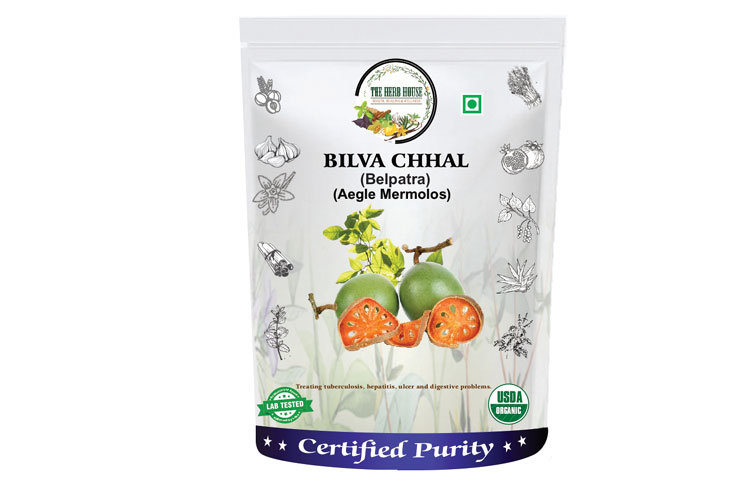
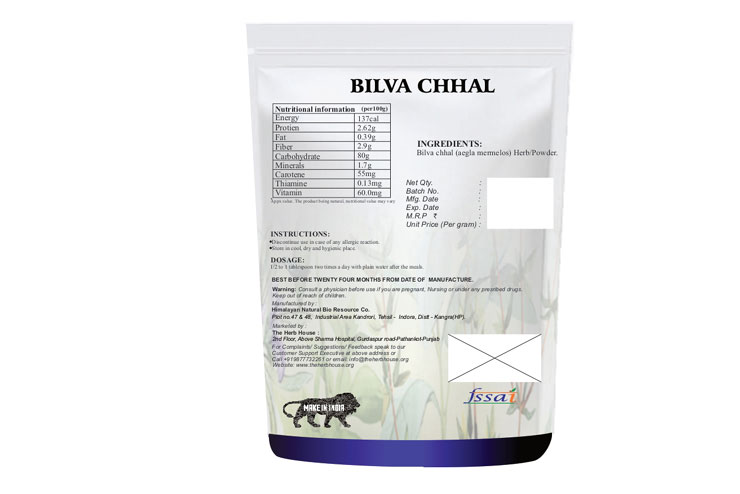
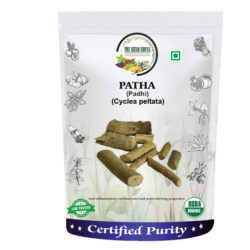
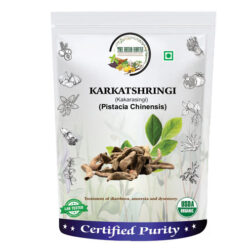
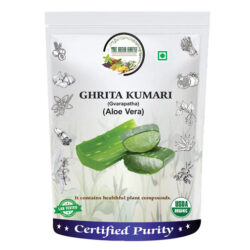
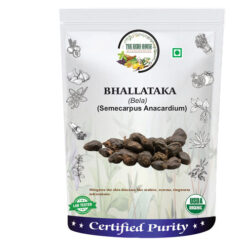
Reviews
There are no reviews yet.